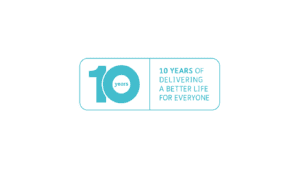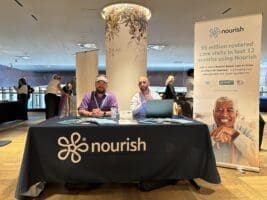Ensuring we stay properly hydrated and eat a balanced diet every day is an essential but sometimes an arduous task. Adults are recommended to drink approximately 1500ml of liquid every single day and eat a minimum of 5 fruits and vegetables as well as food from every food group. How you can ensure these needs are met are explained below.
Nutrition
A shrinking appetite is another side effect of natural ageing and difficulties with tastes and textures are common for those with learning disabilities. But there are many ways to encourage and improve food intake through activities and switching up the way food is presented. Maintaining a healthy weight is essential for keeping a healthy immune system, decreasing the risk of being deficient in nutrients and the chance of broken bones in an accident. For some, maintaining a healthy weight may be a struggle so, with the appropriate advice, fortifying food with cream, milk powder or butter may help. For others, a modified diet is essential to prevent episodes of choking. All food and drink can follow the seven levels of the IDDSI scale. When food is modified to fit the IDDSI scale, it loses its form and looks less appetising. As we typically eat with our eyes, using piping bags or food moulds will help make modified food look more appealing and therefore will help anyone on a modified diet to maintain a healthy weight.
Adding food-based activities to your activity programme will not only increase food intake but also will fall under the category of activities of daily living. These are activities the average adult would do in their own home, such as folding clothes, cooking, and cleaning. Including such activities promotes independence and has a positive impact on mental health, wellbeing, confidence, and self-esteem. There are a lot of different ways to incorporate food into your activities programme. Decorate pizzas with a variety of toppings, peel, or chop vegetables, start a vegetable patch or have themed menus with adjoining activities for the people you support to look forward to.

Hydration
Promoting good hydration has many benefits from boosting brain function, maintaining urinary and kidney health to healthy digestion. Not feeling thirsty is a natural part of ageing and can also be a symptom or a side effect of other health issues. Dehydration, in care homes for the elderly particularly, is linked to increased falls, delirium, increased urinary tract infections and excessive use of antibiotics. Encouraging fluids isn’t always easy but there are some creative ways to increase the fluid intake of the people you support. Serving ice lollies, jelly or soup will all encourage fluid intake.
Incorporating fluids to your activities programme is an effortless way to encourage extra hydration. Making smoothies or mocktails are great activities as you can include the people you support in the creation of the final product as well as increasing fluid intake. Hosting a coffee morning or going out for tea and cake to a local café or garden centre is another enjoyable way to encourage fluid intake.
Our activity planner for 2022 so far includes a few ideas for nutrition and hydration activities, take a look.

How can Nourish help?
The Nourish platform enables you to set fluid goals, monitor food and fluid intake and set alert warnings for anyone you support who has not met their goal for that day. This enables care teams to ensure that the people you support are eating and drinking enough and if they are not, this can be investigated and corrected. Within the Nourish care system, carers can record MUST scores using the BAPEN scale in just three clicks of a button, all previous or historical numerical data is pulled through from previous scores, migrating the information to eliminate the need for manual calculation and reduce the risk of human error. These can be scheduled at regular intervals so that care teams are alerted when MUST assessments are due. Reports can also be generated quickly and easily that compare previous records.
By recording this kind of data and using Nourish’s insights and reports functions, trends will be spotted earlier. Fish & Chip Friday is a common menu theme across care homes and if someone you support periodically leaves their meal untouched on a Friday, it may be the case they do not like this meal. Recording this data in Nourish enables this information to be shared across care teams and departments quickly and easily.
Some of the people you support may have different nutritional needs such as an allergy or a different level of food and drink. This is logged in each resident’s care plan under the eating and drinking section and then contextually summarised for the carers providing fluid or food interactions to view their preferences, likes/dislikes, and dietary requirements. This can either be shown as a checklist for carers to adhere to or a guide, ensuring every carer and every staff member, including agency, are aware of preference or requirement.
With fluid intake, meal preferences and consumption, and MUST scores all recorded and stored in one place and instantly available, updating nutrition and hydration care plans has never been easier or more effective.

If you would like to receive our exclusive monthly activity planner, sign up to our newsletter here.
To find out how our digital care planning platform can enhance the well-being of those you support with hydration and nutrition and more, book your free personalised demo today!







